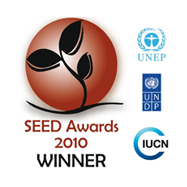History
The roots of DeCo! extend back to 2008, when Ibrahim Amadu and Christoph Schmitz jointly conducted research for their Master`s thesis. They interviewed numerous farmers for their study and discussed the problems farmers face in the North of Ghana. One of the major problems they investigated was the low content of organic matter in the soils and their continued degradation through poor management. They attempted to tackle this problem by informing farmers about the importance of applying more organic matter to the soils. After discussing and collaborating with local NGOs, they founded the FertiSoil initiative. Meanwhile Yakubu Inusah, an experienced business person in the field of soil management, has joined the initiative.
After some time working on this initiative, they realized that farmers have problems getting enough organic matter to add to their fields. Part of the problem was the lack of an official supplier of organic fertilizer in the North. Hence, the FertiSoil Initiative started to produce organic fertilizer composed of poultry manure, neem leaves, and various other inputs. Due to the high community demand, they increased the production in 2010 to three villages covering more than 100 farmers.
After meeting at the EIT Summer School in 2010, Gregor, Maria, Stephen and Katja joined the team. During this time the business model was further developed to a more integrated community approach, involving waste management and composting. This approach leads to a much higher development impact since more local people have to be employed and many benefits are generated by collecting biomass waste. Thereafter, the name changed to DeCo! - Decentralized Composting for Sustainable Farming and Development.
From the very beginning, DeCo! conducted field experiments with the help of important partners like MOFA (Ministry of Food and Agriculture), SARI (Savanna Agricultural Research Institute) and UDS (University of Development Studies). These experiments are ongoing and will be continued in the following years in order to examine the long-term effects of organic fertilizer on the soil. All experiments are independently run by the different partners. Due to the positive results, MOFA and SARI have officially started to recommend DeCo!’s fertilizer to farmers.














